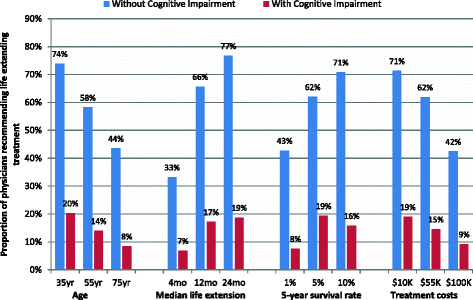Variation in physician recommendations, knowledge and perceived roles regarding provision of end-of-life care
- PMID: 26503417
- PMCID: PMC4623295
- DOI: 10.1186/s12904-015-0050-y
Variation in physician recommendations, knowledge and perceived roles regarding provision of end-of-life care
Abstract
Background: There is high variability in end-of-life (EOL) treatments. Some of this could be due to differences in physician treatment recommendations, their knowledge/attitude regarding palliative care, and their perceived roles in treating patients with advanced serious illness (ASI). Thus, the objective of this paper was to identify potential variation in physician recommendations, their knowledge/attitude regarding palliative care and perceived roles in treating ASI patients.
Methods: A cross-sectional survey consisting of vignettes describing patient characteristics that varied by age, expected survival, cognitive status and treatment costs and asked physicians whether they would recommend life-extending treatments for each scenario, was administered to 285 physicians who treat ASI patients in Singapore. Physicians were also assessed on their knowledge/attitude in palliative care. They were administered a best-worst scaling exercise requiring them to select their most and least important role as a physician caring for an ASI patient.
Results: There was a wide variation in physician recommendations for life-extending treatments for patients with similar profiles, which can partly be attributed to physician characteristics (years of experience and place of training). Only about one-fourth of the physicians answered all knowledge/attitude questions correctly. Statements assessing knowledge/attitude regarding pain management had the fewest correct responses. The most important perceived role regarding provision of EOL care concerned symptom management.
Conclusions: Results suggest that variation in physician treatment recommendations may be partly related to their own characteristics, raising concerns regarding the EOL care being provided to patients. Efforts should be made to better understand this variation and to provide the physicians with additional training in key aspects of palliative care management.
Figures
Similar articles
-
Danish general practitioners' self-reported competences in end-of-life care.Scand J Prim Health Care. 2016 Dec;34(4):420-427. doi: 10.1080/02813432.2016.1249059. Epub 2016 Nov 8. Scand J Prim Health Care. 2016. PMID: 27822976 Free PMC article.
-
Lack of training and Comfort level with Provision of Palliative Care in Puerto Rican Emergency Departments.Bol Asoc Med P R. 2015 Apr-Jun;107(2):92-6. Bol Asoc Med P R. 2015. PMID: 26434094
-
Not just little adults: palliative care physician attitudes toward pediatric patients.J Palliat Med. 2013 Jun;16(6):675-9. doi: 10.1089/jpm.2012.0393. Epub 2013 Feb 27. J Palliat Med. 2013. PMID: 23445249
-
The surgeon-patient relationship in advanced illness.Surg Oncol Clin N Am. 2001 Jan;10(1):25-30. Surg Oncol Clin N Am. 2001. PMID: 11406448 Review.
-
['Caring always'; physicians' expression of condolences to the relatives of patients].Ned Tijdschr Geneeskd. 2001 Nov 10;145(45):2185-7. Ned Tijdschr Geneeskd. 2001. PMID: 11727620 Review. Dutch.
Cited by
-
Hearing, sharing and applying: a qualitative study of the experiences of family caregivers' end-of-life decision-making in Singapore.BMJ Public Health. 2024 May 30;2(1):e000646. doi: 10.1136/bmjph-2023-000646. eCollection 2024 Jun. BMJ Public Health. 2024. PMID: 40018195 Free PMC article.
-
Treatment decisions in end-stage COPD: who decides how? A cross-sectional survey of different medical specialties.ERJ Open Res. 2019 Sep 16;5(3):00163-2018. doi: 10.1183/23120541.00163-2018. eCollection 2019 Jul. ERJ Open Res. 2019. PMID: 31544110 Free PMC article.
-
Discrete Choice Experiments in Health Economics: Past, Present and Future.Pharmacoeconomics. 2019 Feb;37(2):201-226. doi: 10.1007/s40273-018-0734-2. Pharmacoeconomics. 2019. PMID: 30392040 Free PMC article.
-
Preventing rheumatoid arthritis: Preferences for and predicted uptake of preventive treatments among high risk individuals.PLoS One. 2019 Apr 25;14(4):e0216075. doi: 10.1371/journal.pone.0216075. eCollection 2019. PLoS One. 2019. PMID: 31022252 Free PMC article.
-
The clinical and economic consequences of practice style variations in common surgical interventions: A protocol for systematic review.Medicine (Baltimore). 2018 Oct;97(42):e12439. doi: 10.1097/MD.0000000000012439. Medicine (Baltimore). 2018. PMID: 30334941 Free PMC article.
References
Publication types
MeSH terms
LinkOut - more resources
Full Text Sources
Other Literature Sources
Medical



